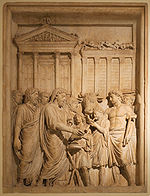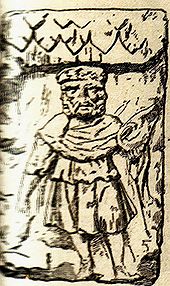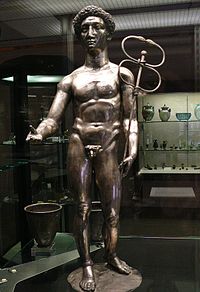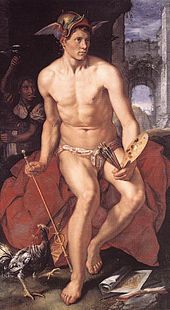- Mercury (mythology)
-
Mercury (
 /ˈmɜrkjʉri/; Latin: Mercurius
/ˈmɜrkjʉri/; Latin: Mercurius  listen (help·info)) was a messenger who wore winged sandals,[1] and a god of trade, the son of Maia Maiestas and Jupiter in Roman mythology. His name is related to the Latin word merx ("merchandise"; compare merchant, commerce, etc.), mercari (to trade), and merces (wages).[2] In his earliest forms, he appears to have been related to the Etruscan deity Turms, but most of his characteristics and mythology were borrowed from the analogous Greek god, Hermes. Latin writers rewrote Hermes' myths and substituted his name with that of Mercury. However, there are at least two myths that involve Mercury that are Roman in origin. In Virgil's Aeneid, Mercury reminds Aeneas of his mission to found the city of Rome. In Ovid's Fasti, Mercury is assigned to escort the nymph Larunda to the underworld. Mercury, however, fell in love with Larunda and made love to her on the way; this act has also been interpreted as a rape. Larunda thereby became mother to two children, referred to as the Lares, invisible household gods.
listen (help·info)) was a messenger who wore winged sandals,[1] and a god of trade, the son of Maia Maiestas and Jupiter in Roman mythology. His name is related to the Latin word merx ("merchandise"; compare merchant, commerce, etc.), mercari (to trade), and merces (wages).[2] In his earliest forms, he appears to have been related to the Etruscan deity Turms, but most of his characteristics and mythology were borrowed from the analogous Greek god, Hermes. Latin writers rewrote Hermes' myths and substituted his name with that of Mercury. However, there are at least two myths that involve Mercury that are Roman in origin. In Virgil's Aeneid, Mercury reminds Aeneas of his mission to found the city of Rome. In Ovid's Fasti, Mercury is assigned to escort the nymph Larunda to the underworld. Mercury, however, fell in love with Larunda and made love to her on the way; this act has also been interpreted as a rape. Larunda thereby became mother to two children, referred to as the Lares, invisible household gods.Mercury has influenced the name of many things in a variety of scientific fields, such as the planet Mercury, and the element mercury.[3] The word mercurial is commonly used to refer to something or someone erratic, volatile or unstable, derived from Mercury's swift flights from place to place. He is often depicted holding the Caduceus in his left hand. The caduceus has also become the symbol of paramedics worldwide.
Contents
Worship
 Marcus Aurelius (head covered)
Marcus Aurelius (head covered)
sacrificing at the Temple of JupiterPractices and beliefsImperial cult · festivals · ludi
mystery religions · funerals
temples · auspice · sacrifice
votum · libation · lectisterniumPriesthoodsCollege of Pontiffs · Augur
Vestal Virgins · Flamen · Fetial
Epulones · Arval Brethren
Quindecimviri sacris faciundisJupiter · Juno · Neptune · Minerva
Mars · Venus · Apollo · Diana
Vulcan · Vesta · Mercury · CeresOther deitiesJanus · Quirinus · Saturn ·
Hercules · Faunus · Priapus
Liber · Bona Dea · Ops
Chthonic deities: Proserpina ·
Dis Pater · Orcus · Di Manes
Domestic and local deities:
Lares · Di Penates · Genius
Hellenistic deities: Sol Invictus · Magna Mater · Isis · Mithras
Deified emperors:
Divus Julius · Divus Augustus
See also List of Roman deitiesRelated topicsRoman mythology
Glossary of ancient Roman religion
Religion in ancient Greece
Etruscan religion
Gallo-Roman religion
Decline of Hellenistic polytheism
Mercury did not appear among the numinous di indigetes of early Roman religion. Rather, he subsumed the earlier Dei Lucrii as Roman religion was syncretized with Greek religion during the time of the Roman Republic, starting around the 4th century BC. From the beginning, Mercury had essentially the same aspects as Hermes, wearing winged shoes talaria and a winged petasos, and carrying the caduceus, a herald's staff with two entwined snakes that was Apollo's gift to Hermes. He was often accompanied by a cockerel, herald of the new day, a ram or goat, symbolizing fertility, and a tortoise, referring to Mercury's legendary invention of the lyre from a tortoise shell.
Like Hermes, he was also a messenger of the gods and a god of trade, particularly of the grain trade. Mercury was also considered a god of abundance and commercial success, particularly in Gaul. He was also, like Hermes, the Romans' psychopomp, leading newly-deceased souls to the afterlife. Additionally, Ovid wrote that Mercury carried Morpheus' dreams from the valley of Somnus to sleeping humans.[4]
Mercury's temple in the Circus Maximus, between the Aventine and Palatine hills, was built in 495 BC. This was a fitting place to worship a swift god of trade and travel, since it was a major center of commerce as well as a racetrack. Since it stood between the plebeian stronghold on the Aventine and the patrician center on the Palatine, it also emphasized the role of Mercury as a mediator.
Because Mercury was not one of the early deities surviving from the Roman Kingdom, he was not assigned a flamen ("priest"), but he did have a major festival on May 15, the Mercuralia. During the Mercuralia, merchants sprinkled water from his sacred well near the Porta Capena on their heads.
Syncretism
 A three-headed image of a Celtic deity found in Paris; interpreted as Mercury and now believed to represent Lugus[5]
A three-headed image of a Celtic deity found in Paris; interpreted as Mercury and now believed to represent Lugus[5]
When they described the gods of Celtic and Germanic tribes, rather than considering them separate deities, the Romans interpreted them as local manifestations or aspects of their own gods, a cultural trait called the interpretatio Romana. Mercury in particular was reported as becoming extremely popular among the nations the Roman Empire conquered; Julius Caesar wrote of Mercury being the most popular god in Britain and Gaul, regarded as the inventor of all the arts.[6] This is probably because in the Roman syncretism, Mercury was equated with the Celtic god Lugus, and in this aspect was commonly accompanied by the Celtic goddess Rosmerta. Although Lugus may originally have been a deity of light or the sun (though this is disputed), similar to the Roman Apollo, his importance as a god of trade made him more comparable to Mercury, and Apollo was instead equated with the Celtic deity Belenus.[4]
Romans associated Mercury with the Germanic god Wotan, by interpretatio Romana; 1st-century Roman writer Tacitus identifies him as the chief god of the Germanic peoples.[7]
In Celtic areas, Mercury was sometimes portrayed with three heads or faces, and at Tongeren, Belgium, a statuette of Mercury with three phalli was found, with the extra two protruding from his head and replacing his nose; this was probably because the number 3 was considered magical, making such statues good luck and fertility charms. The Romans also made widespread use of small statues of Mercury, probably drawing from the ancient Greek tradition of hermae markers.
Names and epithets
Mercury is known to the Romans as Mercurius and occasionally in earlier writings as Merqurius, Mirqurios or Mircurios, had a number of epithets representing different aspects or roles, or representing syncretisms with non-Roman deities. The most common and significant of these epithets included:
- Mercurius Artaios, a combination of Mercury with the Celtic god Artaios, a deity of bears and hunting who was worshiped at Beaucroissant, France.[8]
- Mercurius Arvernus, a combination of the Celtic Arvernus with Mercury. Arvernus was worshiped in the Rhineland, possibly as a particular deity of the Arverni tribe, though no dedications to Mercurius Arvernus occur in their territory in the Auvergne region of central France.[8]
- Mercurius Cissonius, a combination of Mercury with the Celtic god Cissonius, who is written of in the area spanning from Cologne, Germany to Saintes, France.[8]
- Mercurius Esibraeus, a combination of the Iberian deity Esibraeus with the Roman deity Mercury. Esibraeus is mentioned only in an inscription found at Medelim, Portugal, and is possibly the same deity as Banda Isibraiegus, who is invoked in an inscription from the nearby village of Bemposta.[9]
- Mercurius Gebrinius, a combination of Mercury with the Celtic or Germanic Gebrinius, known from an inscription on an altar in Bonn, Germany.[8]
- Mercurius Moccus, from a Celtic god, Moccus, who was equated with Mercury, known from evidence at Langres, France. The name Moccus ("pig") implies that this deity was connected to boar-hunting.[8]
- Mercurius Visucius, a combination of the Celtic god Visucius with the Roman god Mercury, attested in an inscription from Stuttgart, Germany. Visucius was worshiped primarily in the frontier area of the empire in Gaul and Germany. Although he was primarily associated with Mercury, Visucius was also sometimes linked to the Roman god Mars, as a dedicatory inscription to "Mars Visucius" and Visucia, Visicius' female counterpart, was found in Gaul.[8][10]
Mercury's net in Ludovico Ariosto's Orlando Furioso
Vulcan created a net out of unbreakable steel so that he could catch Venus, the goddess of beauty, and Mars, the god of war, in the act of making love. He was jealous of their relationship, because Venus was his wife. Vulcan managed to catch them but, afterwards, Mercury stole the net from the blacksmith god so that he could catch Cloris, a nymph who he admired. Cloris was tasked with flying after the sun while it rose and scattering lilies, roses and violets behind it. Mercury lay in wait for at least several days until he caught her wing in the net over an unnamed great river in Ethiopia. Mercury then gave the net to the temple of Anubis at Canopus to protect the sacred spot. In Ludovico Ariosto's Orlando Furioso, the net is stolen 3,000 years later by Caligorant, who goes on to destroy the temple and the city.[11]
References
- ^ Theoi.com
- ^ http://www.behindthename.com/name/mercury
- ^ “Mercury and hazel” explores the analogies of mercury in mythology, metallurgy and astronomy, and the traditional association of mercury with the fast-growing hazel tree.
- ^ a b Littleton, C. Scott (Ed.) (2002). Mythology: The Illustrated Anthology of World Myth and Storytelling (pp. 195, 251, 253, 258, 292). London: Duncan Baird Publishers. ISBN 1-904292-01-1.
- ^ Bas-relief discovered in Paris in 1867 and preserved at the Carnavalet Museum, from J.-L. Courcelle-Seneuil, Les Dieux gaulois d'après les monuments figurés (The Gallic Gods According to the Figurative Monuments), Paris, 1910.
- ^ De Bello Gallico 6.17
- ^ Germania 9
- ^ a b c d e f Green, Miranda J. (1992). Dictionary of Celtic Myth and Leg,end (pp. 148–149). London: Thames and Hudson. ISBN 0-500-01516-3.
- ^ Alarcão, Jorge de (1988). Roman Portugal. Volume I: Introduction (p. 93). Warminster: Aris and Phillips.
- ^ Espérandieu, E. (1931). Recueil Général des Bas-relief, Statues et Bustes de la Germanie Romaine. Paris and Brussels.
- ^ Ariosto, Ludovico. "Canto XV Lines 47-64." Orlando Furioso. Oxford: Oxford UP, 1998. Print.
Roman mythology and religion Deities Apollo · Bona Dea · Castor and Pollux · Ceres · Cupid · Diana · Dis Pater · Faunus · Genius · Hercules · Janus · Juno · Jupiter · Lares · Liber · Mars · Mercury · Minerva · Orcus · Neptune · Penates · Pluto · Priapus · Proserpina · Quirinus · Saturn · Silvanus · Sol · Venus · Vesta · Vulcan
See also List of Roman deitiesAbstract deities Legendary founders Texts Vergil, Aeneid · Ovid, Metamorphoses and Fasti · Propertius, Elegies Book 4 · Apuleius, Metamorphoses (The Golden Ass)Concepts and practices See also Categories:- Roman gods
- Commerce gods
- Deities in the Aeneid
- Messenger gods
- Trickster gods
- Death deities
Wikimedia Foundation. 2010.


